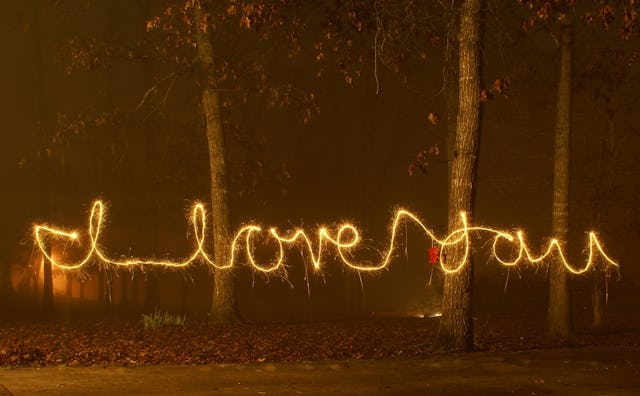What Does "I Love You" Mean?

The other day I asked my boyfriend, “What do you mean when you say ‘I love you’?”
“Erm…”
This probably sounds like the worst question ever to be asked by your girlfriend. Thankfully, he knows me well enough to know that I wasn’t fishing for compliments or looking for reassurance. No, instead I actually wanted to have an analytical discussion about the meaning of the word “love.”
What do we mean when we say “I love you”?
Strangely, “I love you” seems to have a much less fixed meaning than most phrases. Each time I say “I love you,” I’m expressing a cluster of different things, which might include:
* “I care for you really deeply.”
* “I really appreciate you being in my life.”
* “I’m committed to you and our relationship.”
* “I’m really attracted to you.”
* “I’m here for you and I want the best for you.”
* “I’m too lazy to get out of bed right now and it would make me realllly happy if you went downstairs and made me a cup of tea…”
Not every instance of “I love you” is meant to express all of these – it varies a lot from context to context. The “I love you” I say to my boyfriend is very different from the “I love you” I say to a good friend, which is different again from the “I love you” I say to a family member. But even with the same person, “I love you” can mean very different things: When my boyfriend is having a bad day, it means “I care about you deeply, I want you to feel better, and I’m here for you if there’s anything I can do to help.” When I’m having a bad day and my boyfriend comes over to cheer me up, it means, “I really appreciate you and I’m glad you’re in my life.” And in fact, a lot of the time I just say “I love you” because I feel an urge to say it, without consciously thinking about what I’m expressing at all.
© le vent le cri/flickr
You don’t love me like I love you
Think about how bizarre this is. Imagine an alien lands on earth and asks what this phrase “I love you” means. (The alien knows enough English to ask the question, but not enough to understand the phrase, obviously.) What do you tell him? “Well, it’s kind of used to express a deep level of caring, but what exactly it means varies depending on the context and whom you’re talking to, and a lot of the time when people say it they don’t really mean anything specific by it, they just feel like saying it.” Er, what?! Doesn’t that lead to a lot of confusion and miscommunication when the other person doesn’t know exactly what’s being expressed? Why wouldn’t you just have different words or phrases to differentiate among these situations and reduce the ambiguity?
Of course, there are plenty of words in the English language whose meaning varies from context to context. The word “break,” for example, has over 70 possible meanings and uses. But generally context makes the meaning perfectly clear – whilst “break” can mean both a short interlude and the act of splitting something in half, when I tell you I’m “going for a break,” it’s pretty clear which of the two I mean. Obviously context also helps a lot with “I love you” – if I tell my friend I love her after she’s just done me a massive favor, I assume she won’t interpret this as a confession of sexual attraction. But I think there are still a lot of cases where the meaning is a lot harder to decipher, and much more dependent on the intentions of the person saying it – especially in romantic relationships.
© Adam Foster/flickr
Changing how we talk (and think) about love
Maybe a richer vocabulary for love would actually improve our relationships. Different words could mark different stages of commitment, making things clearer to all parties involved. There would be less confusion about whether the person you’re into feels the same about you. Those awkward conversations that start with, “So… where is this going?” would no longer be necessary. Not only would having more words for love remove ambiguity, it would simply allow us to express more. We’ve all been in that situation early on in a relationship where we’re really into someone, but don’t quite feel we’re at the “love” stage yet. How do you express that? You probably awkwardly say something like “I, er, really like you.” This feels pretty lame to me: I mean, I also “really like” coffee, and my dog – and yet I don’t have a good way to tell that guy I’m seeing that how I feel about him is different from how I feel about a great espresso.
It seems strange to me that we have such a limited vocabulary for what is one of the most important parts of human experience and connection. The Greeks had four words for love, and Sanskrit supposedly has 96. It’s been suggested that there’s a close relationship between the words we use and our thoughts: in particular, that the language we speak can affect how we think. I can’t help but wonder what the implication is here for not just how we communicate about love, but how we think about it, too.
Photo: nicholas/flickr
This article was originally published on